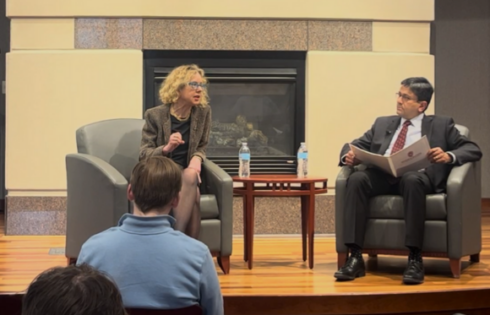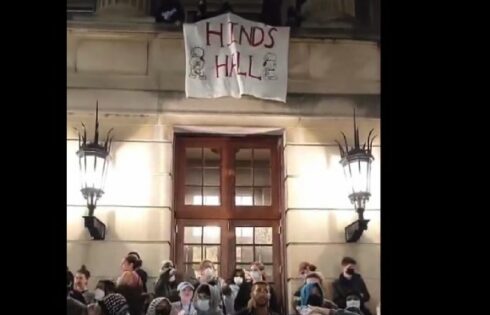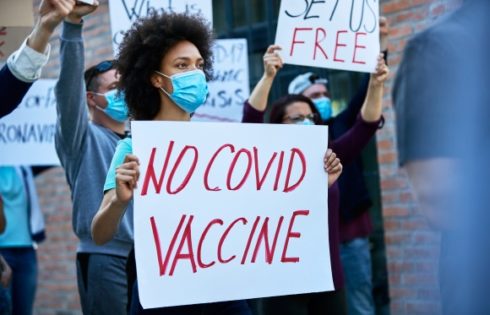
Administrator said speaking about alleged assault could be considered ‘interfering with the process’
A school official at James Madison University recently told a student there to avoid talking to news media about the school’s handling of an alleged assault, claiming that speaking to journalists “could be considered interfering with the process” of adjudicating the event and that the student could suffer penalties under school policy for it.
The student in question, Caroline Whitlow, told The College Fix that she was sexually assaulted by a fellow James Madison University peer on a trip to Ghana in the summer of 2017. The alleged assault took place on a beach, where Whitlow lost consciousness after becoming intoxicated, she said.
“I didn’t report [it] to my professor or the Ghana police because I didn’t think it would be taken seriously,” she said.
Upon returning to the school in Harrisonburg, Virginia, Whitlow said she saw her alleged assailant around campus “almost every day,” causing her to experience panic attacks. In December, about six months after the alleged attack, she reported it to the school’s Title IX office.
Whitlow was assigned a case advisor, Tammy Knott, through the school’s Office of Student Accountability and Restorative Practices.
“She met with me, read me my rights, and allowed me to view my assailant’s Title IX statement in the case file,” Whitlow said.
A hearing with the Office of Student Accountability and Restorative Practices followed, Whitlow said, where, after eight hours of discovery and testimony, the organization found her alleged assailant “not responsible” due to “conflicting or inconclusive evidence.” Whitlow appealed the decision, and subsequently posted about the experience on her Facebook page.
In that post, dated Mar. 29, Whitlow said she was “extremely disappointed to be a student at James Madison University.”
“I trusted JMU to have students’ best interest and safety in mind, but this Board has shown me that my trust was clearly misplaced,” Whitlow said, writing that she was informed of the verdict by way of “a piece of paper with two boxes checked and a one sentence explanation.”
The post prompted a flurry of media attention, after which Whitlow asked Knott, her case advisor, if there was “anything I could get in trouble for saying in terms of interference with the process.”
Whitlow shared Knott’s email response with The Fix, in which the administrator told her: “Until there is a final decision, you cannot do anything that could be seen as interfering with the accountability process.”
“Disclosing information about the case to others who would be writing a news story based on this case could be considered interfering with the process, depending on the circumstances, and you could be charged under the Student handbook policies,” Knott added.
Knott did not respond to repeated requests from The College Fix asking for clarification of her statement to Whitlow.
According to a prominent campus watchdog group, Knott’s instruction to Whitlow is “alarming.”
“It suggests that JMU knows that its Title IX process is so poorly insulated from public pressure that criticism alone (as opposed to new facts or the exposure of bad procedures) may cause the school to reverse its position on whether a sexual assault took place,” Foundation for Individual Rights in Education executive director Robert Shibley said in a blog post.
“If that’s true, that’s a huge indictment of the process itself,” he added.
Whitlow told The Fix via Facebook yesterday that the appeal to the university’s original finding had also found her alleged assailant “not responsible.”
“The decision is not officially final yet, as the Dean of Students still has to review the case,” she added.
Reached for comment via email, university spokesman Bill Wyatt did not directly answer The Fix’s questions about Knott’s warning to Whitlow. Instead, Wyatt directed The Fix to an op-ed published in the school’s newspaper, The Breeze, in which he wrote, in part: “The university doesn’t silence students who come forward; rather, it provides resources and counseling to students to help them understand the process and to get the support they need.”
“The university staff who work on these issues are well trained and extraordinarily dedicated to addressing this significant societal problem,” Wyatt wrote.
MORE: I sat through the entire Yale sexual-assault trial. The media aren’t giving you the full story.
IMAGE: Marcos Mesa Sam Wordley / Shutterstock.com
Like The College Fix on Facebook / Follow us on Twitter






Please join the conversation about our stories on Facebook, Twitter, Instagram, Reddit, MeWe, Rumble, Gab, Minds and Gettr.